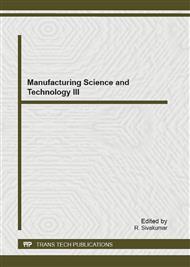p.1439
p.1443
p.1447
p.1451
p.1456
p.1462
p.1467
p.1474
p.1479
Relative Eco-Efficiency Recognition Based on DEA Neural Network
Abstract:
Regional eco-efficiency is regarded as a relative concept. It could be presented the relative eco-efficiency with the change of economy and environment. That means it could not the optimal compared with the predicted optimum in the future. It would be a basis of policy decision making of local governments according to identify the life cycle stage of current regional eco-efficiency. As a beneficial supplement of the eco-efficiency measurement, this paper set up a DEA Neural Network recognition model which can effectively analyze and identify the current relative eco-efficiency of a regional. The empirical research shows that the phenomenon of forecasted value “floating upon” has been restrained effectively. It is an obvious advantage that this method is showed as a method of fast convergence, accurate identification, extensive application and promotion value in practice.
Info:
Periodical:
Pages:
1456-1461
Citation:
Online since:
December 2012
Authors:
Price:
Сopyright:
© 2013 Trans Tech Publications Ltd. All Rights Reserved
Share:
Citation:


